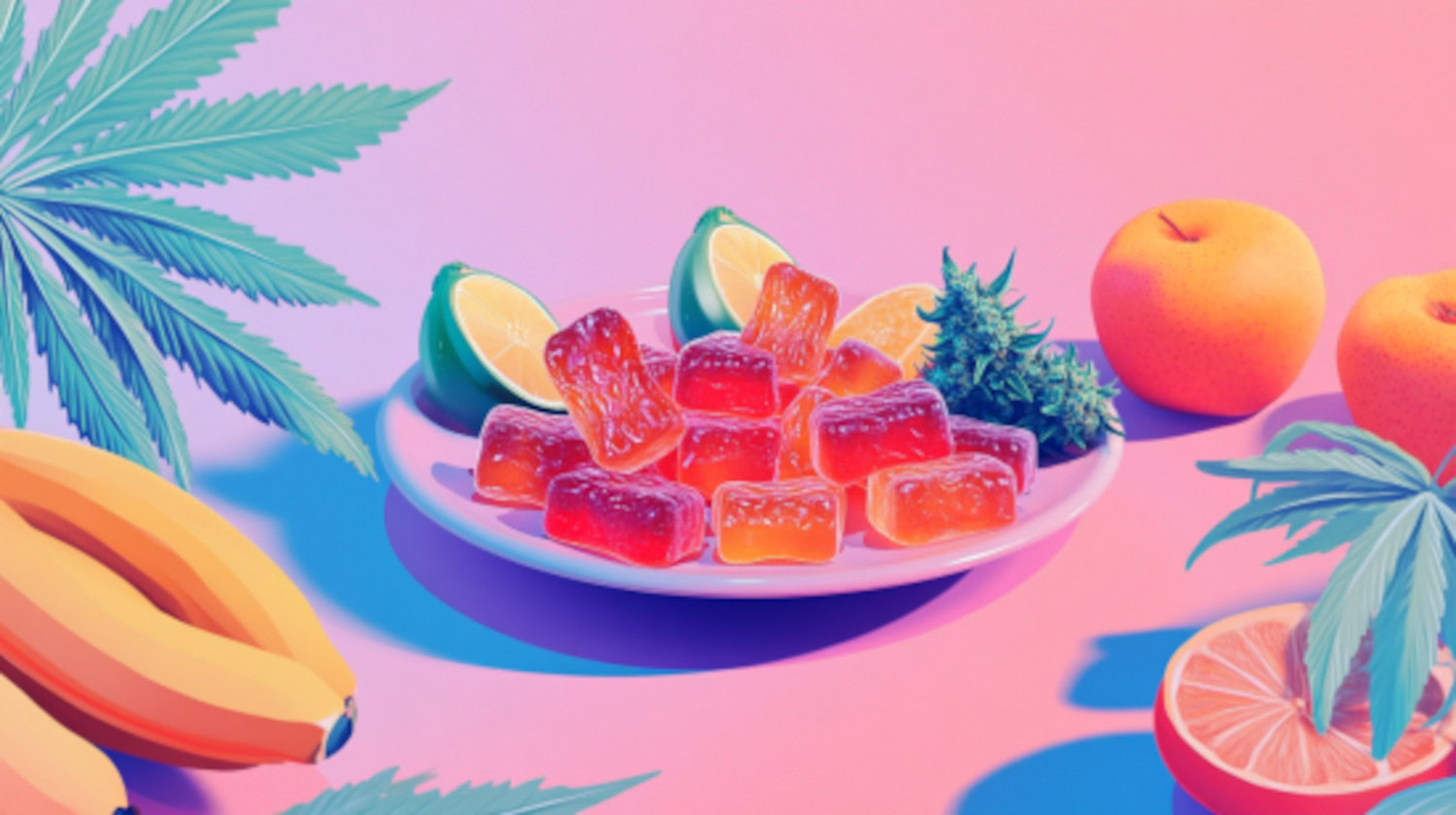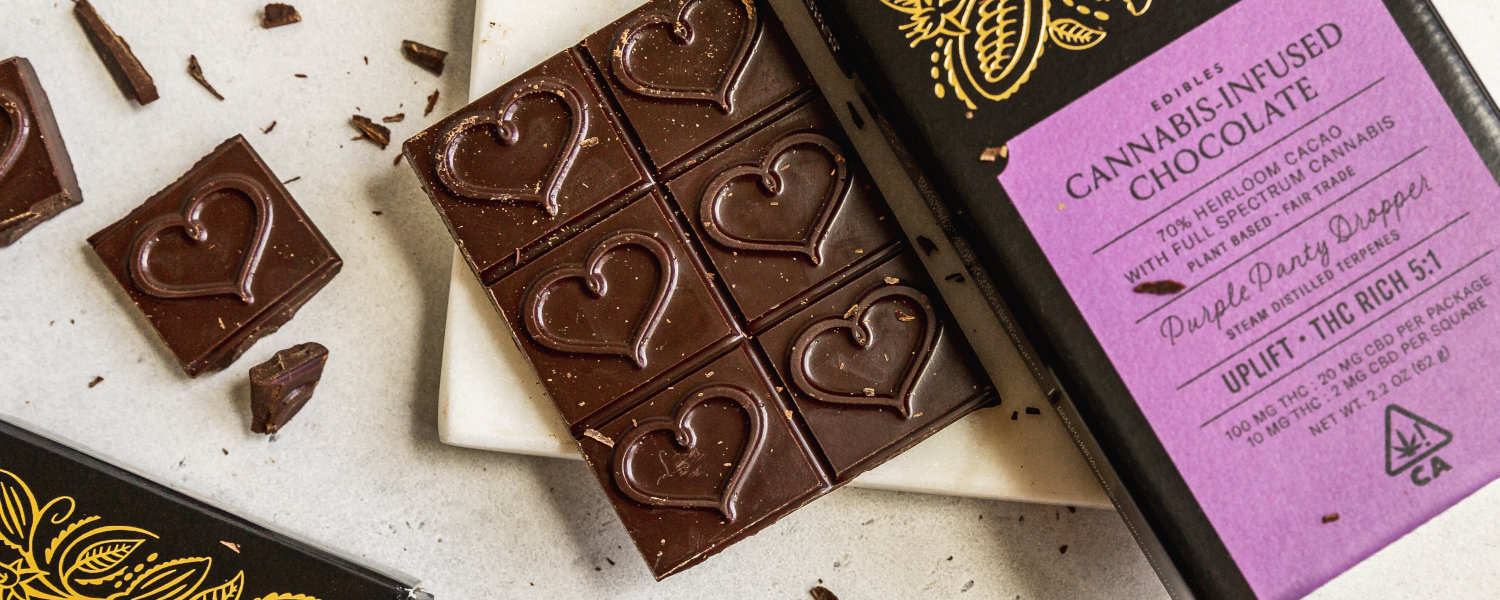In This Article
- What are Vegan Edibles?
- What Makes an Edible Non-Vegan?
- What to Look for in Vegan Edibles
- Read the Ingredient List
- Check for Certifications or Labels
- Allergen Warnings
- Reputable Brand Websites and Reviews
- Common Vegan Swaps for Edible Recipes
- Cannabutter
- Plant Milks
- Eggs
- Chocolate
- Top Vegan Edible Brands
- Pantry Cacao Keto Bites
- Wana Brands
- PLUS
- Ms. Greenfield's Hard Drops
- Can CBD Edibles Be Vegan?
- Are Delta-8 Gummies Vegan?
- Do Vegan Gummy Bears Exist?
- Are Pure Edibles Vegan?
Key Takeaways
- Vegan edibles replace animal-based ingredients with plant-based alternatives.
- Before making any purchases, shoppers should inspect labels for any possible animal-derived components or processing concerns.
- Instead of buying vegan edibles, many make their own at home.
Not too long ago, vegans had few options when it came to edibles. But now, with the edibles space offering a wide range of options, that isn’t the case. Today, vegans can enjoy store-bought edibles or make their own at home, providing them with a world of ways to enjoy infused edibles.
What are Vegan Edibles?
Vegan edibles are smokeless cannabis-infused food products free of any animal-derived ingredients. They allow vegans to enjoy potent, plant-based treats like any other vegan product without compromising their dietary principles.
Much of today’s products sold online and in dispensaries tend to center on vegan THC gummies, chocolates, and beverages. However, various options exist, including vegan brownies, caramels, food oils, etc.
The options expand even more when they are brought into the DIY realm, where home chefs can create their own infused vegan edibles however they like.
And remember, before buying or making edibles, double-check that edibles are legal in your state, as laws can and often do vary.
What Makes an Edible Non-Vegan?

Any food item containing animal products or byproducts is considered non-vegan. That makes any items with meat, eggs, dairy, and other common animal products or byproducts off the list. That, however, does not account for all the non-vegan food products on the market.
When shopping for vegan items, edibles, or otherwise, consumers need to keep an eye out for a rather long laundry list of items that contain animal-derived components. They include:
- Gelatin: Derived from animal collagen, it is often used in gummies and marshmallows for chewiness.
- Dairy: Milk, butter, casein, whey, and other dairy ingredients are common in baked goods.
- Eggs: Egg whites, yolks, and/or dried egg powder are also frequently used in baked goods for their binding capabilities.
- Honey: Honey is a bee by-product used in some edibles for added sweetness.
- Dyes: Some food colorings are derived from insects.
- Bone Char: Most cane sugar in the US is processed using animal bones. To avoid this, look for products that either use organic sugar, coconut or beet sugar, or are certified vegan.
Vegans or anyone preparing vegan food should know this list of possible ingredients and processes to watch out for. Those mentioned above are just a fraction of the list, with PETA providing one of the more extensive collections of all possible concerning components.
What to Look for in Vegan Edibles

Avoiding the components listed above is essential to maintaining a vegan diet. Doing so means becoming familiar with every food purchased and/or consumed. Additionally, vegans need to check their labels and other sources of information to avoid any mistakes. Steps to ensure this doesn’t happen include:
Read the Ingredient List
Reading is always a great place to start. If any components like gelatin or milk powder are mentioned, it’s safe to assume the item isn’t vegan. Alternatively, when searching for vegan gummies, look for ingredients like pectin, a common vegan swap for gelatin.
Check for Certifications or Labels
Look for certifications or labels on the packaging that demonstrate a product is animal-free.
Allergen Warnings
Allergen warnings mentioning milk or eggs signal that the edible contains one or more of those ingredients or was processed in the same facility.
Reputable Brand Websites and Reviews
Word of mouth is key. If the brand does not have a positive reputation, consider shopping for another item. Check the brand’s website and third-party sellers, and if possible, ask friends or fellow consumers for feedback.
Whether buying vegan edibles, trying a friend’s home creation, or making them yourself, the rule remains: check your sources before consuming—especially when adhering to a certain diet.
Common Vegan Swaps for Edible Recipes

Making vegan THC gummies, baked goods, and other infused items is a rather straightforward skilled process, calling for the occasional ingredient swaps to ensure the recipe is animal-free. Some of the common plant-based substitutions used to make vegan edibles include:
Cannabutter
Vegans can use a plant-based cannabutter or try coconut oil, olive oil, or vegan margarine.
Plant Milks
Many non-dairy options are readily available, including almond, soy, and oat milk. However, keep an eye out for flavorings. While not vegan, these milk alternatives can significantly alter the taste of a recipe. Stick to plain unless the recipe requires a certain flavor.
Eggs
Flaxseed meal, applesauce, or aquafaba all serve as egg replacements capable of binding a baked good’s ingredients.
Chocolate
Rather than milk chocolate, consider a dairy-free dark chocolate or carob.
Do you need to brush up on the basics before baking or cooking? NuggMD’s beginner’s guide to making marijuana edibles offers some entry-level tips.
Top Vegan Edible Brands
The spread of legalization opened the door for a wave of edible brands, many of which offer some or all of their products in vegan form. A few of the most well-known and commonly purchased brands include:
Pantry Cacao Keto Bites
These rich, chocolatey bites from Pantry are both Keto and vegan-friendly with a short list of clean ingredients, like cocoa butter, cacao, and coconut sugar. These dark chocolate bites make an excellent health-conscious edible option with a minimal amount of sugar and a ton of great taste.
Wana Brands
Wana is a major US player that touts its commitment to vegan, melt-proof products derived from cannabis and hemp.
PLUS
PLUS' new portfolio of edibles is entirely vegan and infused with a solventless hash for fast-acting effects.
Ms. Greenfield's Hard Drops
Ms. Greenfield's offers an array of hard candy drops in various flavors and doses of THC. They're made with natural colors and flavors that all come from plant sources, offering a tasty animal-free edible experience.
No matter the item, consumers should always check the company’s website and packaging and/or ask a budtender to confirm whether a product meets vegan standards.
Can CBD Edibles Be Vegan?
Yes. Be it CBD or THC, most infused edibles can be made with a vegan recipe and process. The cannabinoid featured in the recipe won’t impact its vegan status, as cannabis is plant-based.
Are Delta-8 Gummies Vegan?
Some delta-8 gummies are vegan. Like with any infused edibles, the vegan status all depends on the brand’s recipe, not its cannabis content.
No matter the cannabinoid, always verify the product’s contents before purchasing. Additionally, some hemp-derived delta-8 and other minor cannabinoid products are made with limited oversight, highlighting the importance of third-party lab tests. In both cases, confirm the product’s contents before purchasing and/or consuming.
Do Vegan Gummy Bears Exist?
Yes, but not often in infused forms. States typically ban edibles that resemble traditional children’s candy. As such, edibles producers generally avoid shapes and figures that might appeal to minors. If a seller has infused gummy bears, these items likely came from an unlicensed producer.
Are Pure Edibles Vegan?
‘Pure edibles’ is a term used to identify products with minimal ingredients, such as single-origin cannabis-infused coconut oil or a simple tincture. Many products designated as pure are inherently vegan, but that isn’t always the case, as some may use honey or dairy-containing flavorings.
The information in this article and any included images or charts are for educational purposes only. This information is neither a substitute for, nor does it replace, professional legal advice or medical advice, diagnosis, or treatment. If you have any concerns or questions about laws, regulations, or your health, you should always consult with an attorney, physician or other licensed professional.




